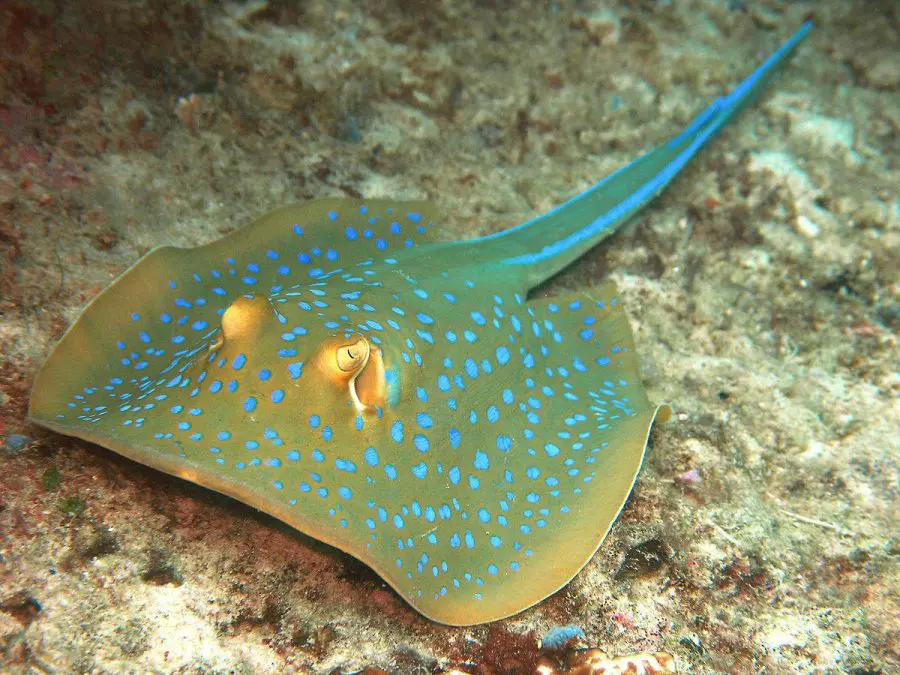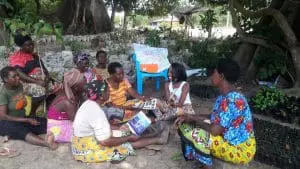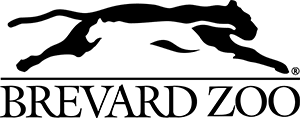

A bluespotted fantail ray, one of the species helped by A Rocha Kenya. (Taeniura lymma)
By visiting Brevard Zoo, YOU make an incredible impact on our natural world! Did you know that 25 cents of every daily admission and $5 of every membership goes toward our Quarters for Conservation program, which funds conservation projects throughout the world? In this “Updates from the Field” series, we’re sharing more on the projects YOU have funded!
Today, we’re learning more about one of our 2023 recipients, A Rocha, from Bob Sluka a Lead Scientist with Lead Scientist A Rocha’s Marine Conservation Programme.
When and how did A Rocha organization begin?
A Rocha is celebrating its 40th birthday this year. The name comes from Portuguese for “the rock” referring both to the initial location of our work in the Algarve area of southern Portugal and to our Christian inspiration. Originally started by several British families, a field study center began in Portugal in 1983 and began to attract many who felt alienated by traditional churches’ lack of attention to the environment and who desired a place where all were welcome regardless of color or creed. A residential study center was born and still thrives where scientists, volunteers, clergy and anyone who shows up on the doorstep can come and enjoy the hospitality of an active conservation center with a table at its heart – food and great conversation after a day of field work. Those who visited dreamed of such a place in their home country and our work spread over the past years to now include 20 national organizations and a growing number of associated Friends of A Rocha network across six continents. Not all have a residential center, but all try to live our our core values in the specific location and with the specific species that are found on their doorstep. Though we are faith-based, we are not faith-biased. We work with any and all who want to conserve biodiversity.
- Could you tell us more about A Rocha’s mission?
A Rocha is a global family of conservation organizations working together to live out God’s calling to care for creation and equip others to do likewise.
We respond to the global crisis of biodiversity loss by carrying out community-based conservation projects, through
ecological monitoring and research in areas of high value for wildlife;
practical measures for conserving and restoring habitats and their fauna and flora;
participation in nature conservation, through environmental education and community outreach;
providing a forum for understanding the relevance of the Christian faith to environmental issues.
Can you tell us about the animals A Rocha helps?
As a global family focused on placed-based conservation, our work spans a wide range of animals across the world. We protect seabirds in New Zealand, frogs in Singapore, pangolins in Ghana, tigers in India, moths in Portugal, the sailish sucker fish in Canada and closer to home horseshoe crabs in the Indian River Lagoon. Our work in Kenya includes protecting important forest habitat that houses the golden rumped elephant shrew, endemic birds such as the Sokoke owl, and marine habitats that house a wealth of biodiversity including coral reefs where we have a rewilding program restoring species lost through coral bleaching. The Zoo specifically funds our project on sharks, rays and guitarfish where we are working to protect several species which are threatened primarily from overfishing. We use the IUCN Red List to help guide our work in determining the level of endangeredness of these species. The shark, ray and guitarfish species in Watamu Marine National Park and Mida Creek near A Rocha Kenya’s residential field study center called Mwamba include the Critically Engangered Halavi guitarfish (Glaucostegus halavi), two Endangered rays (Coach Whipray Himantura uarnak and Whitespotted Eagle Ray Aetobatus narinari) and though rarely seen the Endangered Whale Shark (Rhincodon typus) We also study and help protect a breeding population of the Vulnerable Blacktip Reef Shark (Carcharhinus melanopterus) – our beach surveys of small shark pups are always a joy.
 We appreciate that many of A Rocha’s programs involve the community as well. Why is this so important?
We appreciate that many of A Rocha’s programs involve the community as well. Why is this so important?
A Rocha works with many communities on a global as well as local level. At the global level, we are an official IUCN member contributing to the World Conservation Congress, UN Oceans Conference, Climate COPs, and international biodiversity, habitat, and conservation forums. This provides a means for our distinctive voice to contribute to global conservation efforts and we support the Sustainable Development Goals in our work. We also speak as scientists to the global church community helping the billions of people around the world who identify as Christian to better understand their responsibility and privilege to actively conserve this planet.
At a local level, we are embedded in local communities and each of our national organizations is led and run by nationals of that country. We aim to work long term in specific places and this is best exemplified by our 40 year presence in the Algarve of southern Portugal. Our Kenyan team has been in place for 25 years. Conservation in Kenya started as something often done to local communities – the focus was at times solely focused on animal conservation. It is now recognized that not only does that not work practically, but that people are nature and part of the ecosystem. There is a recognition that all have to thrive including people. Much of conservation involves working with local communities to understand their needs and values and how that intersects with activities that are either helpful for or hurtful for animal populations. For example, early work by our Kenyan team studying the Arabuko Sokoke forest, one of the last remnants of a once wide ranging forest on Africa’s east coast, found that many hunted rare wildlife in order to generate extra money to pay for school fees. In Kenya, high schoolers have to pay for their education. They thus began a program to generate funds for scholarships for local students from ecotourism activities and began livelihood generation activities among those families to reduce hunting and protect animals like the golden rumped elephant shrew on one end of the size range and African elephants on the other end. Our work among fishing communities helps fishers to understand the ecology of local fish species to reduce impacts of fishing for juveniles, for example, with mosquito nets or the importance of sharks and rays as top predators. Our environmental education team goes into schools to provide interesting lessons using local examples, rather than the UK textbooks previously used talking of badgers and deer. Classes visit our field study center and visit marine habitats with some students never before having seen creatures such as seastars, molluscs or if they get a chance to snorkel, coral reef fish. Without the support and understanding of the local community it is difficult, if not impossible, to conserve biodiversity.
How will the funds from Brevard Zoo help A Rocha?
A Rocha Kenya is blessed to have a spectacular location for its field study center – right on the shores of Watamu Marine National Park. We have a great relationship with the management authority for the park Kenya Wildlife Services. The data we collect and our work with the local community directly benefit the management of the park and help to reduce impacts on these habitats. With the financial help from the Brevard Zoo, we will be able to monitor sharks, rays and guitarfish inside of this amazing national park. Additionally, we will be able to explore areas surrounding the park with less protection and which we have been unable to do so before primarily from a lack of funding. Work with the local fishing community to help them better understand the value of these animals to the overall ecosystem, including their own health and wellbeing, along with ongoing programs to increase livelihood opportunity will help reduce fishing pressure on these species. Particularly with the Halavi guitafish, we want to make sure this species does not go extinct in the wild – it is only one step away as judged by the IUCN Red List! The work in Kenya inspires action and hope across the globe.
Brevard Zoo is an independent, not-for-profit organization that receives no recurring government funding for our operating costs. Your generous support enables us to continue to serve our community and continue our vital animal wellness, education and conservation programs.
